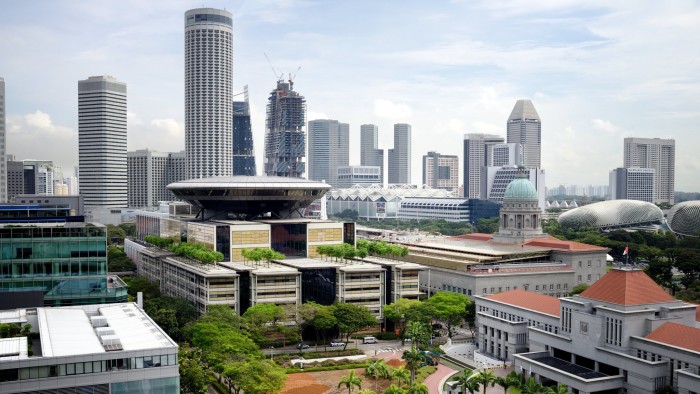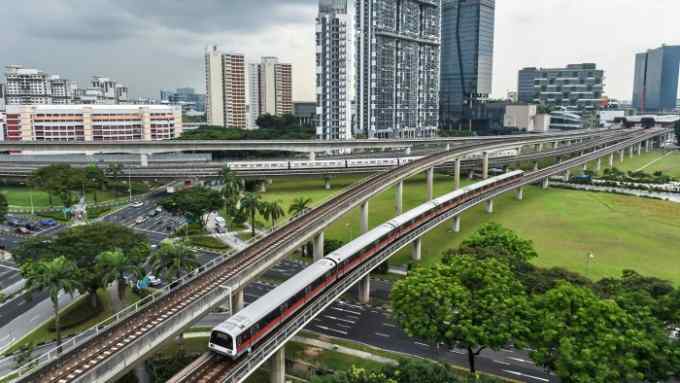Early reforms recast Singapore as hub for legal services

Roula Khalaf, Editor of the FT, selects her favourite stories in this weekly newsletter.
When Patrick Ang started his career 30 years ago, the Singaporean lawyer’s clients were almost entirely local. Now a managing partner at Rajah & Tann, one of Singapore’s biggest law firms, Mr Ang has witnessed a global transformation for both the industry and his business.
“After 2000, more work involved Singapore parties going outside and some foreign parties coming in. That is when I first started to detect the Singapore legal scene changing,” he says. As the global financial crisis struck a decade ago, global business interest in Asia and Singapore increased, resulting in more business for the city state’s corporate lawyers.
“The big four Singapore law firms never thought they would break through 200 lawyers, and then in the late-2000s all four did,” he says.
The turn of the century also brought another significant legal change when the city state permitted foreign lawyers to practise Singaporean law in joint ventures with local firms. The move was significant: Singapore became the first country in south-east Asia to liberalise its legal profession.
Rachel Eng, now a member of PwC’s global legal leadership team but at the time a lawyer at WongPartnership, says: “[The liberalisation] brought in a lot of competition, but also allowed us to improve. We saw international legal documents and learnt from them, but also had to compete to survive.”
The market opening spurred the development and growth of local commercial law firms and helped Singapore establish itself as a regional hub for legal services. By contrast, legal systems in Asian countries such as India and Malaysia remain protectionist.
However, the most celebrated legal success story is the growth of the Singapore International Arbitration Centre. In 2018, the centre received 402 new cases from parties in 65 jurisdictions and is now the world’s third-busiest arbitration centre.
It trails only the London Maritime Arbitrators Association and the ICC International Court of Arbitration in Paris in the size of its caseload. Though set up six years later, it has grown faster than its main regional competitor, the Hong Kong International Arbitration Centre.
Singapore competes with Hong Kong on many fronts as an international hub for dispute resolution and commercial legal services — but has a few advantages over its rival. Singapore is considered neutral ground as trade tensions escalate between China and the US; the city state maintains close ties with both superpowers.
This month’s political turmoil in Hong Kong, in which residents protested against a since shelved proposal enabling extraditions to mainland China, further enhanced Singapore’s attractiveness as a liveable city and a secure hub for professional services.
The Singaporean government’s next focus is preparing its legal institutions and practices to compete in a digital economy.
Unusually, the judiciary — a bastion of tradition in many countries — plays a prominent role in driving innovation, and the courts have a history as early adopters of technology. Almost 20 years ago, Singaporean courts were among the first in the world to implement electronic filing of court documents.
Earlier this year, Ken Hwee Tan took on the newly created role of chief transformation and innovation officer at Singapore’s supreme court, and is leading a series of initiatives to improve and digitise legal processes. These include electronic hearings to allow individuals to make court appearances remotely.
The development of legal technology and innovation in Singapore is different in another respect. Government, regulators and professional bodies frequently act in co-ordination in what Paul Neo, chief operating officer at the Singapore Academy of Law, the promotion and development agency for the industry, describes as “a whole ecosystem approach”.
The state also plays an active role in selecting and promoting the adoption of legal technology. In May 2019, government ministries and the Law Society of Singapore launched Tech-celerate for Law, a scheme under which S$3.7m ($2.7m) has been set aside to fund law firms’ implementation of technologies.
The government is co-ordinating stakeholders to promote the use of Singapore law across the region. “Our influence and spread is quite limited until we can propagate Singapore law to be used in the way English law is. Why shouldn’t Singapore law be the default for south-east Asia?” says Ms Eng at PwC.
Exports have been the main driver of growth in the legal services sector over the past decade. According to the Ministry of Law, the sector’s nominal value grew from S$1.5bn in 2009 to S$2.3bn in 2018, while exports grew from S$434m to S$1.07bn over the same period.
However, as Singapore becomes a more prominent international legal services hub, its progress in areas such as innovation and technology are increasingly at odds with more conservative elements of the legal system.
For instance, in the area of civil liberties, Singapore scores poorly on international indices for citizens’ freedom, and LGBT people continue to face discrimination.
Yasmin Lambert is a partner and senior consultant at RSG Consulting, a legal consultancy

Comments